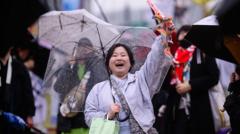South Korea has officially scheduled a presidential election for June 3, as announced by the acting president, Han Duck-soo. This decision follows the impeachment of Yoon Suk Yeol, who was dismissed by the country's constitutional court after declaring martial law in a controversial move that led to widespread political unrest.
During a press conference on Tuesday, Han emphasized the need for the nation to "quickly heal from the wounds" inflicted by recent events and to strive for progress. Yoon’s controversial martial law declaration, which he justified as a response to threats from "anti-state forces" and North Korea, ultimately revealed underlying domestic strife rather than external pressures, contributing to his downfall. Yoon has also faced separate insurrection charges in a criminal court.
Several political figures have hinted at their intentions to enter the presidential race, including labor minister Kim Moon-soo, who resigned to pursue his campaign, and Ahn Cheol-soo, a prominent lawmaker from the ruling People Power Party. The leading contender, however, is opposition leader Lee Jae-myung, who narrowly lost to Yoon in a previous election. A recent Gallup poll shows Lee with a 34% approval rating, indicating his potential strength in the upcoming election.
As the nation grapples with Yoon's divisive legacy, protests against his administration have intensified, while his supporters grow increasingly assertive. Additionally, South Korea faces new economic pressures, notably the introduction of a 25% export tariff to the United States, prompting calls for negotiations with the Trump administration as the country navigates this complex political and economic landscape.
During a press conference on Tuesday, Han emphasized the need for the nation to "quickly heal from the wounds" inflicted by recent events and to strive for progress. Yoon’s controversial martial law declaration, which he justified as a response to threats from "anti-state forces" and North Korea, ultimately revealed underlying domestic strife rather than external pressures, contributing to his downfall. Yoon has also faced separate insurrection charges in a criminal court.
Several political figures have hinted at their intentions to enter the presidential race, including labor minister Kim Moon-soo, who resigned to pursue his campaign, and Ahn Cheol-soo, a prominent lawmaker from the ruling People Power Party. The leading contender, however, is opposition leader Lee Jae-myung, who narrowly lost to Yoon in a previous election. A recent Gallup poll shows Lee with a 34% approval rating, indicating his potential strength in the upcoming election.
As the nation grapples with Yoon's divisive legacy, protests against his administration have intensified, while his supporters grow increasingly assertive. Additionally, South Korea faces new economic pressures, notably the introduction of a 25% export tariff to the United States, prompting calls for negotiations with the Trump administration as the country navigates this complex political and economic landscape.






















